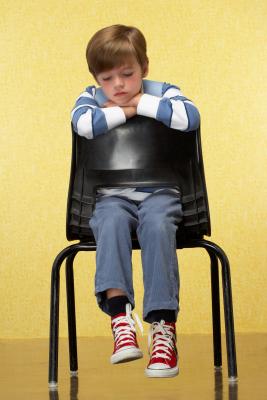Bed-wetting is common among potty-trained children, affecting some 7 million in the U.S., according to the American Academy of Family Physicians, or AAFP. Bed-wetting, also known as nocturnal enuresis, may have more than just one cause. In most circumstances, the only treatment your child needs is a little more time — and your patience.
Facts
Most children are sufficiently potty-trained between the ages of 2 and 4. However, even though they may stay dry during the day, for many of them, bed-wetting may still poses a problem. Bed-wetting isn’t uncommon in school-age children, with between 15 and 30 percent of 6-year-olds wetting the bed at least once a month. Four percent or more of 12-year-olds still wet the bed occasionally. According to the AAFP, your child isn’t considered a bed-wetter unless he’s 5 years old and wets the bed at least twice each month. Boys are three times as likely as girls to wet the bed.
Possible Causes
Bed-wetting may be hereditary, says the AAFP. If you or your partner wet the bed when you were children, your child is more likely to have the same problem. The bladders of some children haven’t developed enough to hold urine during the course of the night, while others may not have enough anti-diuretic hormone, or ADH, to slow the rate at which urine is produced during sleep. The Mayo Clinic indicates that a stressful episode or time of life, such as the arrival of a new sibling or starting school, can cause bed-wetting as well.
Self Worth
Bed-wetting can make your child’s self-esteem take a tumble, but it’s not a sign that she has a behavioral problem. The AAFP stresses that waking up to a damp bed isn’t your child’s fault, and this should be conveyed to her through your words and deeds. Never punish your child because she has an accident at night or turn it into a huge issue. Don’t let your child be on the receiving end of sibling teasing or jokes. Emphasize to the rest of the family that your child has no control over the situation — and make sure your child knows that he’s not to blame, says the AAFP.
Is It Serious?
Most potty-trained children who wet the bed aren’t unhealthy, says the AAFP. In some circumstances, bed-wetting can be a sign of an underlying medical problem, such as sleep apnea, a urinary tract infection, chronic constipation and, very rarely, an anatomical defect. Sudden bed-wetting is often a sign of diabetes, cautions the Mayo Clinic. However, a child with diabetes will also exhibit other signs and symptoms as well, such as fatigue, extreme thirst and weight loss coupled with an increased appetite.
Tips
Most children outgrow bed-wetting. However, it may be helpful to purchase a bed-wetting alarm, which your child wears while he sleeps. When the alarm senses urine, it wakes your child so he can finish his business in the toilet. With a success rate of between 50 and 70 percent, this device may benefit children who are able to wake up and go to the bathroom on their own some of the time.
Don’t give your child large quantities of liquids before he goes to bed, advises the AAFP. It may also be helpful to wake him up an hour or two into sleep and have him empty his bladder.
Use a water-resistant cover to protect the mattress until your child’s bed-wetting problem is behind him.





